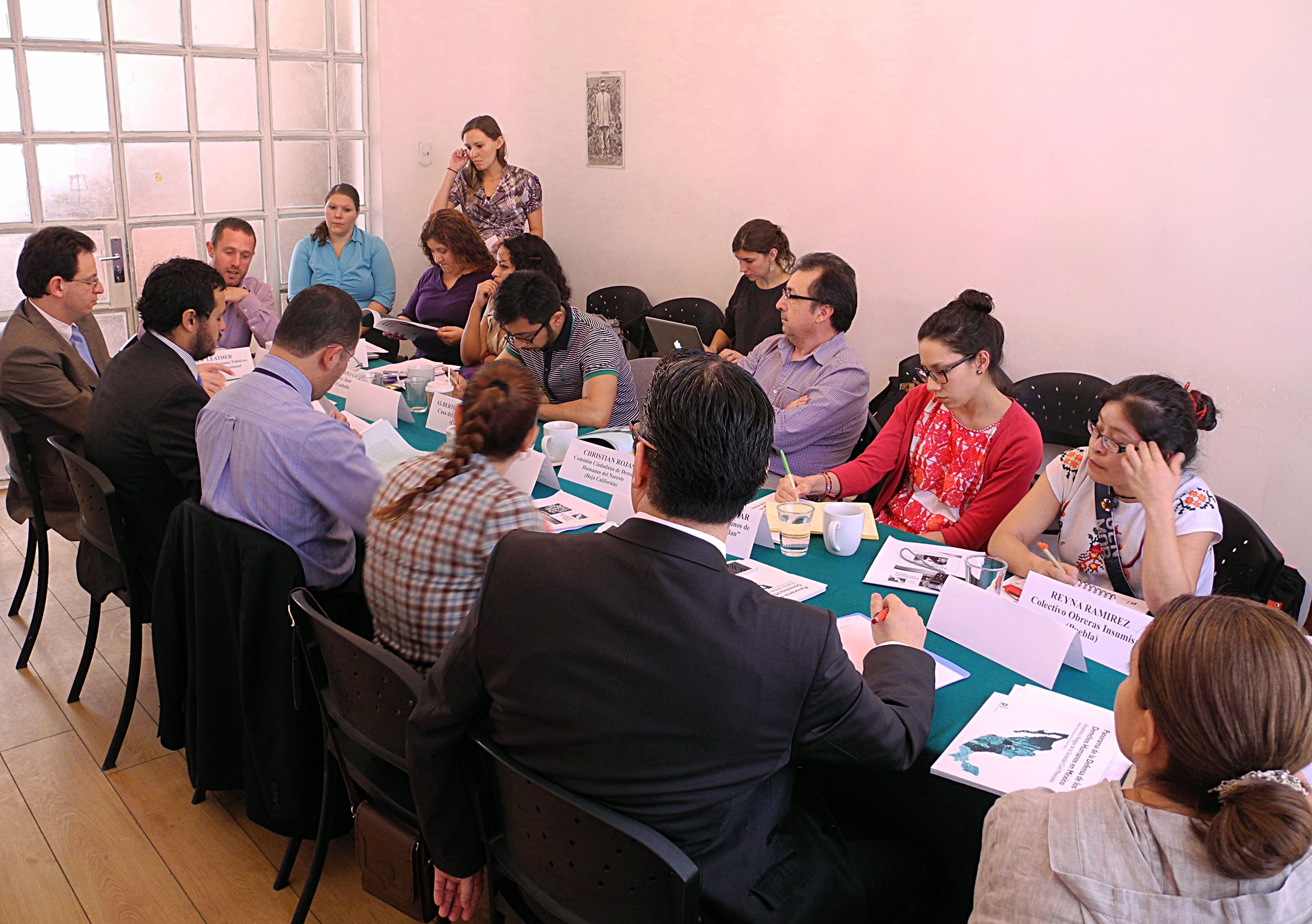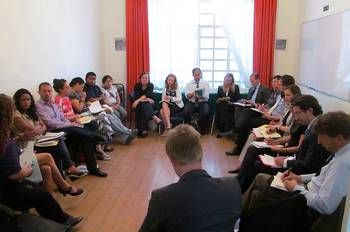
In the round tables organised by PBI to launch the report on 3 April, representatives of civil society organisations shared their concerns about the human rights situation in Mexico, and the challenges in terms of protection and full participation of HRDs, with spokespeople from the National Security Commission (Comisión Nacional de Seguridad) of the Ministry of Foreign Affairs (Secretaría de Relaciones Exteriores), the Federal Attorney General’s Office (Procuraduría General de la República, PGR), and the Fifth Inspectorship of the National Human Rights Commission (Comisión Nacional de Derechos Humanos, CNDH). Later, in a second round table, the HRDs participated in a similar dialogue with representatives from the embassies of Canada, Colombia, Finland, France, Germany, Ireland, Norway, Spain, Switzerland, the United States, the United Kingdom, and the European Union delegation to Mexico. The dialogue was observed by Jesús Peña, Deputy Representative to Mexico of the Office of the United Nations High Commissioner for Human Rights (OHCHR).
 Participating in the round table were men and women HRDs from eight states in the south, centre and north of Mexico, representing some of the cases which appear in the publication. Participants were: Bettina Cruz, of the Assembly of Indigenous Peoples of the Isthmus of Tehuantepec in Defence of Land and Territory (Asamblea de Pueblos Indígenas del Istmo de Tehuantepec en Defensa de la Tierra y el Territorio, Oaxaca); Alberto Xicoténcatl, director of the Saltillo Migrants’ House (Casa del Migrante Saltillo, Coahuila); Antonio Lara, of the Centre for Human Rights “Zeferino Ladrillero” (Centro de Derechos Humanos “Zeferino Ladrillero”, CDHZL) and the Mexico State Social Movement (Movimiento Social Mexiquense, Mexico State); Alma Rosa García, of the “Fray Juan de Larios” Diocesan Centre for Human Rights (Centro Diocesano de Derechos Humanos “Fray Juan de Larios”, (Coahuila); Christian Rojas, of the Citizens’ Commission of Human Rights of the Northeast (Comisión Ciudadana de Derechos Humanos del Noroeste, CCDH, Baja California), María Luisa Aguilar, on behalf of the Tlachinollan’ Human Rights Centre of the Montaña (Centro de Derechos Humanos de la Montaña ‘Tlachinollan’, Guerrero); Reyna Ramírez, of the Insubordinate Women Workers’ Collective (Colectivo Obreras Insumisas, Puebla); and Imelda Marrufo coordinator of the Round Table of Women of Juárez City (Red Mesa de Mujeres de Ciudad Juárez, Chihuahua).
Participating in the round table were men and women HRDs from eight states in the south, centre and north of Mexico, representing some of the cases which appear in the publication. Participants were: Bettina Cruz, of the Assembly of Indigenous Peoples of the Isthmus of Tehuantepec in Defence of Land and Territory (Asamblea de Pueblos Indígenas del Istmo de Tehuantepec en Defensa de la Tierra y el Territorio, Oaxaca); Alberto Xicoténcatl, director of the Saltillo Migrants’ House (Casa del Migrante Saltillo, Coahuila); Antonio Lara, of the Centre for Human Rights “Zeferino Ladrillero” (Centro de Derechos Humanos “Zeferino Ladrillero”, CDHZL) and the Mexico State Social Movement (Movimiento Social Mexiquense, Mexico State); Alma Rosa García, of the “Fray Juan de Larios” Diocesan Centre for Human Rights (Centro Diocesano de Derechos Humanos “Fray Juan de Larios”, (Coahuila); Christian Rojas, of the Citizens’ Commission of Human Rights of the Northeast (Comisión Ciudadana de Derechos Humanos del Noroeste, CCDH, Baja California), María Luisa Aguilar, on behalf of the Tlachinollan’ Human Rights Centre of the Montaña (Centro de Derechos Humanos de la Montaña ‘Tlachinollan’, Guerrero); Reyna Ramírez, of the Insubordinate Women Workers’ Collective (Colectivo Obreras Insumisas, Puebla); and Imelda Marrufo coordinator of the Round Table of Women of Juárez City (Red Mesa de Mujeres de Ciudad Juárez, Chihuahua).
The main topics addressed gave an overview of the significant human rights issues highlighted in Panorama de la Defensa de los Derechos Humanos en México: Iniciativas y Riesgos de la Sociedad Civil Mexicana. These included security, militarisation and abuse of power; transnational migration; forced disappearance; femicide; labour rights; and defence of land, territory, natural resources, and collective and environmental rights. These concerns reflect some of the work conducted by men and women HRDs in Mexico, and the difficulties and risks that they face.
The HRDs shared the opinion that the greatest obstacles to their increased safety and participation are impunity, defamation, lack of adequate protection, and absence of spaces for consultation and dialogue. They asked that both the Mexican Government and the diplomatic corps took actions to overcome these challenges. The government and CNDH representatives expressed their desire to work together with civil society, and to take steps to halt human rights abuses and ensure greater protection for HRDs. They committed to participating in round-table talks to monitor the agreements and requests made during the 5 April meeting. For their part, the members of the diplomatic corps reiterated their support for the work of HRDs, and expressed their concern for the obstacles impeding their security and full participation.
The published document includes some of the progress made and the good practices exhibited by the Mexican authorities and international human rights organisations. In the conclusion, PBI examines the security situation faced by Mexican HRDs, and makes recommendations to both the Mexican Government and representatives of the international community to assist in providing an adequate response to HRDs’ need for protection and participation.
In 2012, PBI conducted an exploratory mission to six Mexican states: Baja California, Chihuahua, Coahuila, Mexico State, Puebla and Tlaxcala. The main objective of the mission was to compile data on the situation of men and women HRDs, and to consider the suitability of PBI operating in other regions of Mexico (in addition to Oaxaca, Guerrero and Mexico City). The states selected were the fruit of careful analysis and PBI’s years of experience in Mexico, and a response to requests for accompaniment which PBI has received in recent years. The information collected was primarily aimed at expanding the geographical scope of PBI’s work in Mexico. As a result, the PBI Mexico Project will open a new, regional team in 2013, which will cover the states of Chihuahua and Coahuila.
For more information
Peace Brigades International (PBI) – Mexico Project
Communications Coordinator
Graciela Martínez González
comunicacion(at)pbi-mexico.org
Telephone: (011) 5514 3855
Facebook: /PBIMexico
Twitter: @PBI_Mexico
Web:www.pbi-mexico.org
